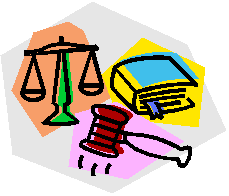|
In
your lifetime, who do you know predicted the fall of the Iron  Curtain, the growth and far reaching impact of the internet, and the
related stock market tech boom-then-bust of the late 1990’s.
Very few predicted these, and I would venture to say no one predicted any
of them except very close to the events; yet all of these are having huge long
term impacts, just like other major events of years past. Curtain, the growth and far reaching impact of the internet, and the
related stock market tech boom-then-bust of the late 1990’s.
Very few predicted these, and I would venture to say no one predicted any
of them except very close to the events; yet all of these are having huge long
term impacts, just like other major events of years past.
One
of the biggest hang-ups we need to shed is what we judge to be fair.
Many judge that life is not fair. We
falsely think that if our Creator is good and what He creates is good, then
there should not be toil and suffering; however, we reach this conclusion from
very narrow perspectives:
 |
We
often do not consider that trials often lead to positive outcomes: building
one’s character, perseverance, empathy, an attitude focused on the needs
of others, etc. The opposite is often true from being spoiled: shallow
and stupid thinking, laziness, no stamina, selfishness, …. Also many
trials are nothing more than the withholding of gifts from our Creator; e.g.
if a farmer was blessed several seasons with bountiful crops, is a normal
crop then a curse? And what if the crop was to feed an army of an evil
nation? Real Life quickly gets too complicated for any of us to be
all-wise judges of what is truly fair in the long run. |
 |
From
our very limited capability to comprehend long term consequences, to
properly consider the vast range and number of human interactions, and
seemingly random events of nature. |
 |
We
have short time horizons. Retirement is the longest term plan most
ever work towards, and even that goal is developed only over a few decades. |
 |
We
typically fail to include the afterlife in our considerations. |
When
we start to create robots that can think and are self aware, only we can
determine if what they do is “right” or not, because only we know their
purpose and can judge their actions. In
the same manner, only our Creator can judge our actions or tell us how we fit
into His plan. By virtue of Him
creating everything that we know, like it or not, He does have the right to make
the rules.
Most
would agree that the bulk of suffering and struggles is self induced or the
direct result of someone else’s sin. These
suffering and struggles come with the territory of “free will” that our
Creator has given us. Yes, negative
consequences are the natural outcome of bad decisions.
 The two related issues of sin everyone wrestles with sooner or later are
unpunished injustice and unwarranted hardship.
We all know that injustice exists around us, and that many evil deeds go
unpunished; however, the key piece to answering the question of unpunished
injustice is: what happens after we die. If
there is no afterlife, we might as well eat, drink, and seek pleasure whenever
possible; or commit suicide whenever the outlook is bleak.
But a Heaven and Hell do exist, and our decisions have eternal
consequences. Our Creator, being a
perfect judge, executes perfect justice in determining who goes to Heaven and
who goes to Hell, and the degrees of rewards in Heaven and punishments in Hell.
He also often orchestrates circumstances to deliver justice even to the
living. But
how do we really know if we have a soul .................... The two related issues of sin everyone wrestles with sooner or later are
unpunished injustice and unwarranted hardship.
We all know that injustice exists around us, and that many evil deeds go
unpunished; however, the key piece to answering the question of unpunished
injustice is: what happens after we die. If
there is no afterlife, we might as well eat, drink, and seek pleasure whenever
possible; or commit suicide whenever the outlook is bleak.
But a Heaven and Hell do exist, and our decisions have eternal
consequences. Our Creator, being a
perfect judge, executes perfect justice in determining who goes to Heaven and
who goes to Hell, and the degrees of rewards in Heaven and punishments in Hell.
He also often orchestrates circumstances to deliver justice even to the
living. But
how do we really know if we have a soul ....................

|
